Society for Appraisal and Women Empowerment in Rural Areas (SAWERA) is a human rights organisation, NGO in KPK and Tribal Regions, Pakistan. It works for the welfare of women and children. It was founded in 2004 and formally registered in 2008 by the human rights defender Fareeda Afridi and some other like minded women and men. Lal Jan Afridi is one of the male founding members of this women's rights struggle. In July 2012, Farida was killed by motorcycle-borne gunmen. [1] [2] [3] [4]
SAWERA received the 2014 Front Line Defenders Award for Human Rights Defenders at Risk. [5]
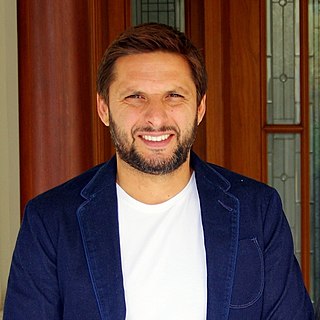
Sahibzada Mohammad Shahid Khan Afridi, known as Shahid Afridi, is a Pakistani cricketer and the former captain of the Pakistan national cricket team. An all-rounder, Afridi bowled leg spin and was recognized for his aggressive batting. Afridi was also a world record holder, holding the record for the fastest ODI century, in 37 deliveries. The record stood for 17 years before being broken by Corey Anderson. He also holds the record for having hit the most sixes in the history of ODI cricket. Bowling-wise Afridi, who considers himself a better bowler than batsman, has taken 395 wickets in ODI and 48 Test wickets. In addition he has also taken 98 T20I wickets.

Hina Jilani, is an advocate of the Supreme Court of Pakistan and a human-rights activist from Lahore in Punjab, Pakistan.

Asma Jilani Jahangir was a Pakistani human rights lawyer and social activist who co-founded and chaired the Human Rights Commission of Pakistan. Jahangir was known for playing a prominent role in the Lawyers' Movement and served as the United Nations Special Rapporteur on Freedom of Religion or Belief and as a trustee at the International Crisis Group.

The Human Rights Commission of Pakistan (HRCP) is an independent, democratic non-profit organisation. Founded in 1987, it is one of the oldest human rights organisations in the country. HRCP is committed to monitoring, protecting and promoting human rights in Pakistan. It is not associated with the government or with any political party. In May 2020 the Commission outlined a number of human rights failings, including unabated honour killings, forced conversions of minority Hindu under-age girls and continued use of a blasphemy law that carries the death penalty to intimidate and settle scores.

Women in Pakistan make up 48.76% of the population according to the 2017 census of Pakistan. Women in Pakistan have played an important role throughout Pakistan's history and they are allowed to vote in elections since 1956. In Pakistan, women have held high offices including that of the Prime Minister, Speaker of the National Assembly, Leader of the Opposition, as well as federal ministers, judges, and serving commissioned posts in the armed forces. Major General Shahida Malik, attaining the highest military post for a woman. Benazir Bhutto was sworn in as the first woman Prime Minister of Pakistan on 2 December 1988.
A human rights defender or human rights activist is a person who, individually or with others, acts to promote or protect human rights. They can be journalists, environmentalists, whistle-blowers, trade unionists, lawyers, teachers, housing campaigners, or just individuals acting alone. They can defend rights as part of their jobs or in a voluntary capacity. As a result of their activities, they can sometimes be the subject of reprisals and attacks of all kinds, including smears, surveillance, harassment, false charges, arbitrary detention, restrictions on the right to freedom of association, and physical attacks.

The situation of Human Rights in Pakistan is complex as a result of the country's diversity, large population, its status as a developing country and a sovereign Islamic democracy with a mixture of both Islamic and secular law. The Constitution of Pakistan provides for fundamental rights. The Clauses also provide for an independent Supreme Court, separation of executive and judiciary, an independent judiciary, independent Human Rights commission and freedom of movement within the country and abroad. However these clauses are not respected in practice.
Front Line Defenders or The International Foundation for the Protection of Human Rights Defenders is an Irish-based human rights organisation founded in Dublin, Ireland in 2001 to protect those who work non-violently to uphold the human rights of others as outlined in the Universal Declaration of Human Rights.
Honour killings in Pakistan are known locally as karo-kari. Pakistan has the highest number of documented and estimated honour killings per capita of any country in the world; about one-fifth of the world's honour killings are committed in Pakistan. An honour killing is the homicide of a member of a family or social group by other members, due to the belief the victim has brought dishonour upon the family or community. The death of the victim is viewed as a way to restore the reputation and honour of the family.
Arnold Heredia was born in Karachi, Pakistan in 1940. He attended the Christ the King Seminary (Pakistan) and was ordained a priest of the Roman Catholic Archdiocese of Karachi in 1965. Among his pastoral work he served tribal people in the interior of Sindh province.
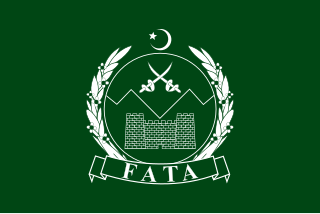
The Federally Administered Tribal Areas (FATA); Pashto: فدرالي قبايلي سيمې; Urdu: وفاق کے زیر انتظام قبائلی علاقہ جات was a semi-autonomous tribal region in northwestern Pakistan that existed from 1947 until being merged with neighboring province Khyber Pakhtunkhwa in 2018. It consisted of seven tribal agencies (districts) and six frontier regions, and were directly governed by Pakistan's federal government through a special set of laws called the Frontier Crimes Regulations. It bordered Pakistan's provinces of Khyber Pakhtunkhwa, Balochistan, and Punjab to the east, south, and south-east respectively, and Afghanistan's provinces of Kunar, Nangarhar, Paktia, Khost and Paktika to the west and north. The territory is almost exclusively inhabited by the Pashtun, who also live in the neighbouring provinces of Khyber Pakhtunkhwa and Northern Balochistan, and straddle across the border into Afghanistan. They are mostly Muslim.
Dasht-e Yahudi, or the Jewish Desert, is a region referred to by Persian and early Mughal historians for a stretch of territory that comprised the most western parts of modern-day Peshawar, Charsadda, Malakand and Mardan districts where these border with Khyber Agency and Mohmand Agency. Although not a desert, it is a semi-arid area in most of its parts.

Soni Sori is an Adivasi school teacher turned political leader of Aam Aadmi Party in Sameli village of Dantewada in south Bastar, Chhattisgarh, India. She was arrested by the Delhi Police's Crime Branch for Chhattisgarh Police in 2011 on charges of acting as a conduit for Maoists. During her imprisonment, she was tortured and sexually assaulted by Chhattisgarh state police. By April 2013, the Indian Courts had acquitted her in six of the eight cases filed against her due to lack of evidence. After release from prison, Sori began campaigning for the rights of those caught up in the conflict between Maoist insurgents and the government, in particular criticising police violence against tribespeople in the region.
Fareeda "Kokikhel" Afridi was a Pashtun feminist, a women's rights activist in Pakistan. In July 2012, at the age of 25, she was shot dead on her way to work.
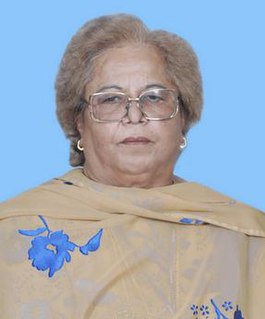
Malik Mehrun Nisa Afridi was a Pakistani Lawyer and a Politician. She was twice member of the Lower house of Parliament. She was elected on Reserved Seats for Women in the 8th National Assembly from 1988 to 1990 and again in the 13th National Assembly from 2008 to 2013. She joined Pakistan Peoples Party on April 24, 1968 as a Student Leader and stayed loyal to her party till her death on March 4, 2013. She was a successful Lawyer well respected by her peers. She was a member of the Central Executive Committee of the Pakistan Peoples Party.
Ruth Mumbi, born in Kiamaiko, a Nairobi slum is a Kenyan Human Rights Defender with a record defending vulnerable women who are at risk. In 2010 she founded and led 'Warembo Ni Yes' which was a group of young women who were keen on ensuring the passing of the current constitution of Kenya. She is the leader of Bunge la Wamama mashinani, a platform that has earned her recognition in her work as a human rights defender.
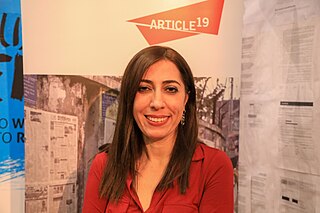
Nurcan Baysal (*1975) is a Kurdish journalist from Turkey, based Diyarbakır. In 2018 she was named Global Laureate for Human Rights Defenders at Risk by Front Line Defenders, an Irish human rights NGO.
Aware Girls is a non-governmental organization in Peshawar, Pakistan, founded in 2002 which aims to address violence and discrimination against women and young girls in Pakistan, and advocate for women's rights, education, and access to sexual and reproductive health resources. Their stated aim is "to strengthen the leadership capacity of young women enabling them to act as agents of social change and women empowerment in their communities."
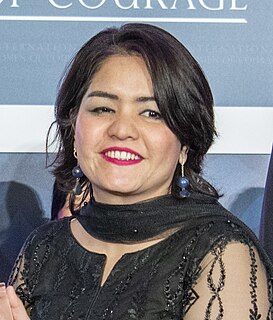
Jalila Haider is a human rights attorney and political activist from Quetta, a city in Balochistan, Pakistan. Haider is known to be the first woman lawyer from the Hazara minority of Quetta and has been an advocate for the rights of her persecuted community in Pakistan. She is a member of Awami Workers Party (AWP), leader of the Balochistan chapter of Women Democratic Front (WDF), and is also an activist in the Pashtun Tahafuz Movement (PTM). She founded a non-profit organisation, 'We the Humans – Pakistan', which aims to empower local communities in Balochistan by strengthening opportunities for vulnerable women and children.

Zahra Mohamed Ahmad is a Somali human rights activist and lawyer. She is the founder of the Somali Women Development Center. She was awarded the International Women of Courage Award in 2021.